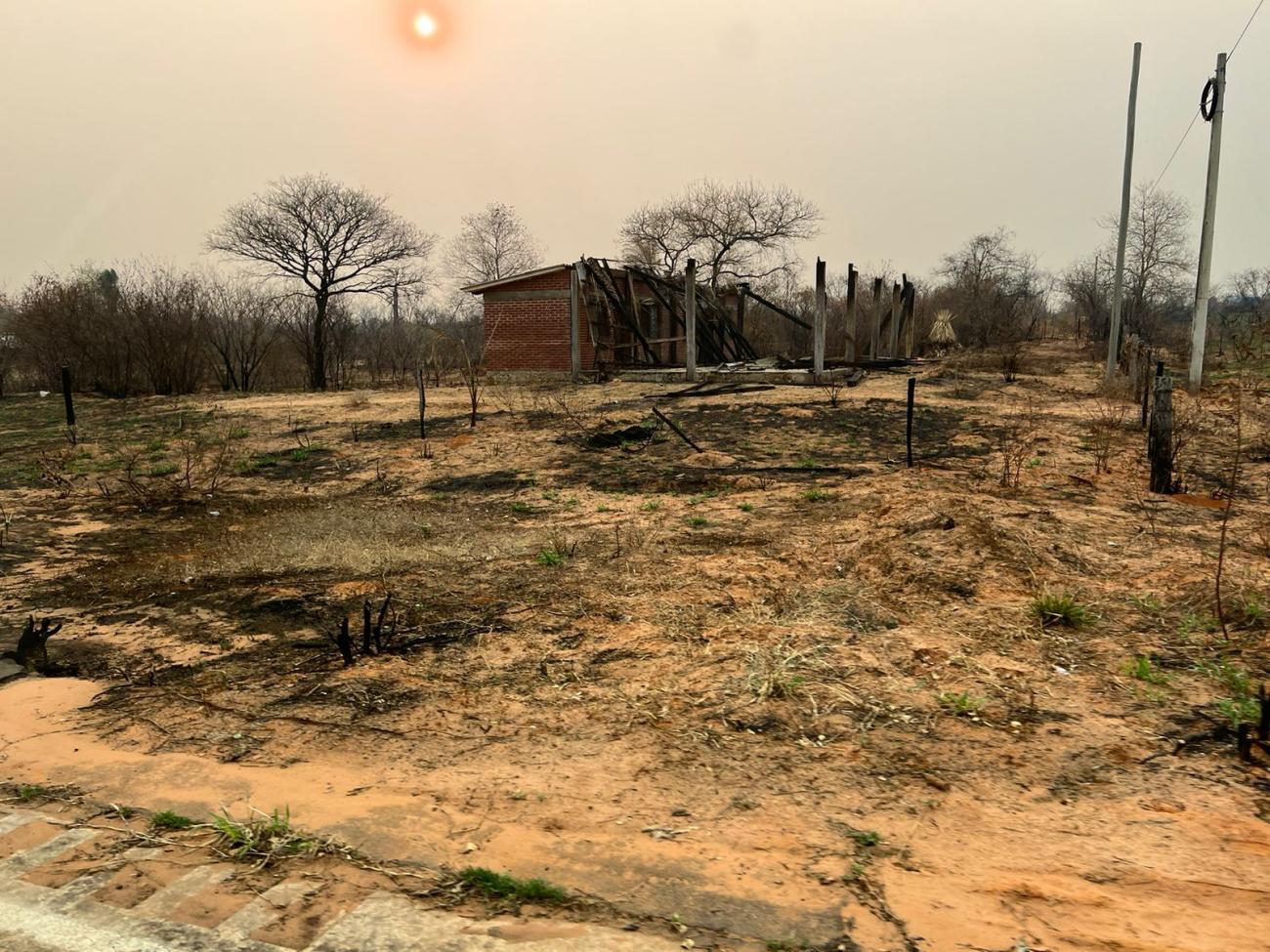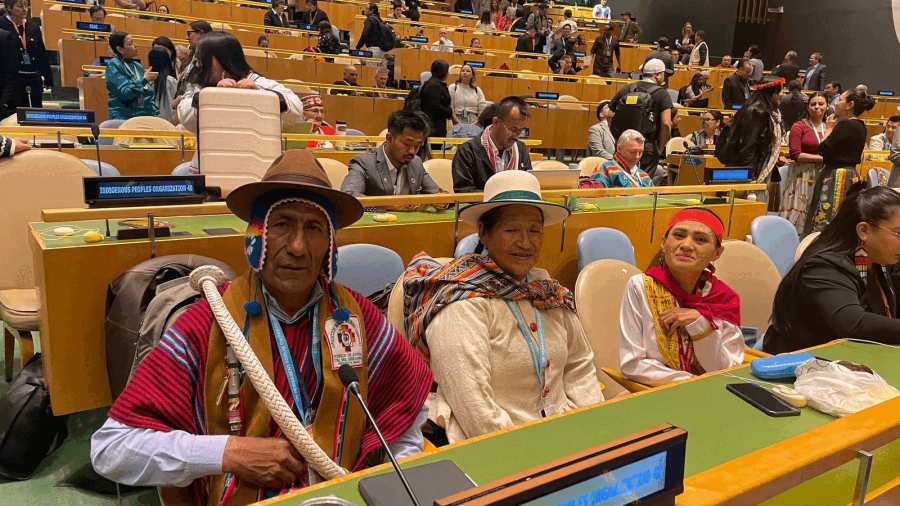
By Diana Pastor (Maya K'iche', CS Staff) and Belén Iñiguez (CS Staff)
From May to October 2024, several fires broke out in different parts of Chiquitanía, Santa Cruz, Bolivia, with serious consequences for the forest and the surrounding populations. Fires have been a phenomenon repeated every year in this area. Still, in 2024, they lasted several months and covered all regions of the Chiquitanía (previously, they occurred only in some areas and communities). According to Infobae, as of November 1, more than 10 million hectares had been consumed in this region. Rosa Pachuri Paraba, an Indigenous Chiquitanian woman and regional president of the Chiquitanian women-run ORMICH (an organization that brings together 800 women from five provinces of the department), indicates that the fires were extreme this year, burning not only the plants and animals but also houses, crops, and domestic animals. What made the fires particularly voracious this year?
It all started in the province of Angel Sandoval, with some territories where the fire appeared, and then spread to the province of Chiquito. The province where Rosa lives, in San Rafael de Velasco, was also affected, in addition to the Ñuflo de Cháves community. Rosa explains: "As Indigenous Peoples, we have lived with fire since our ancestors; fire has always been part of us; we live with it because we know that without fire, we cannot make our food. When we did our chazo (controlled burning so that the land would be fertile), we burned in a controlled manner. Why? Because we knew how to burn when we had to do it, and how to control the fire."
Rosa indicates that since 2019, the fires have been caused by outsiders. In the Chiquitanía, the Indigenous people know it is essential to take care of the "big house," as they call their territory and forests because they know the importance of the trees, animals, and plants. They know that they depend on it to survive. However, people from outside the community, with permits granted by the government, have come to the territories inhabited by Indigenous Peoples and have claimed them as their own. Rosa believes that those entering the area have realized that the best way to do so is through the fires because after the fires are over, they change the use of the land for cultivation.
Rosa makes it clear, "The fires are not of nature. We have a climate crisis and emergency, as well as deforestation of the forests, so now, a small fire becomes uncontrollable with the wind, and then it advances for miles and miles. As in many Latin American countries, monocultures are advancing by leaps and bounds, mainly soybean, sunflower, and sorghum crops, which are not even consumed in the communities. The producers take advantage of the burned lands and put their machinery in to continue with the monocultures. "We grow crops of a maximum of five hectares; they are diversified crops, mainly of medicinal plants or seedlings, and we do it manually, without machinery," argues Rosa.
Another problem in the Chiquitanía is the notable control over agriculture and land burning exercised by the Mennonite community. Rosa mentions: "Like the businessmen, they seem to act with impunity since the laws are not effectively applied to them. Many have burned land without the situation being controlled. In contrast, Indigenous Peoples face rigorous enforcement of Bolivian laws. If an Indigenous person burns, they face immediate consequences; however, Mennonites pay a fine and continue with their activities. This inequality in the application of the law is evident."
The reality is that many Indigenous people do not have the resources to pay these fines, which complicates the situation even more. Rosa explains that in the communities, they ask themselves: "What will happen now? What will we do about the fires that have devastated our forests and crops? How are we going to live?" The problem is affecting their food and water sources. Communities are facing drought and loss of their crops due to the fires. Previously, with what little there was, they could produce bananas, cassava, or some other fruits, but now they have nothing.
The fires are also severely affecting the health of the communities in the Chiquitanía. People are suffering from eye diseases, diarrhea, vomiting, and infections, especially women. In extreme cases, some pregnant women have lost their babies due to the physical effort of fighting the fires and breathing in too much smoke. The only ones left at home are the children. However, it is not only the fires that are causing problems for Indigenous Peoples and the forest. The communities surrounded by national or foreign businessmen with monocultures are harmed by the chemicals and agrochemicals they spray with planes and drones. "The authorities are only interested in paying businessmen," Rosa says.
The government declared a state of emergency due to pressure from people on social networks. Help was received from volunteer firefighters from other departments and also volunteer community firefighters. "There was help from collectives, institutions, and organizations supporting the firefighters mainly with food, water, energizer, and all that. But very little help reached the communities. For example, in Roboré (my community), the fire is already out; nobody comes to visit us, and nobody comes to say how we are after the fires. Nobody comes to see if we have water, how we are surviving, if we are sick after the fires, nothing, nobody shows up," says Rosa.
The Bolivian government delivered food parcels through the municipalities and in coordination with some Indigenous community centers and Civil Defense. However, stocks are limited: one liter of oil, four kilos of noodles, and four kilos of sugar. There was no medicine or water. Accessing the aid was so cumbersome that some people decided not to receive the help. A traditional authority (cacique) from Roboré explains why: "I prefer to let them keep [the aid]. It is more profitable for the community to buy their products in the municipality because what the government sends through Civil Defense does not cover the transportation costs to pick up what is in the lot. It is unfortunate that, given the possibilities, the authorities do not facilitate direct delivery. During the current crisis, with the increase in fuel and transportation prices, this only aggravates the situation."
The women of Chiquitanía are trying to distribute the aid they have received to different affected people. They are also looking for alliances to reach the communities and deliver the small amounts of aid they receive. Transportation is difficult, but they are trying to assemble the deliveries to make it easier. Rosa says: "Even though the government and other organizations do not speak out against the fires, we keep going. It doesn't matter how much we get; what we have, we will get to where it is needed. That is what we are currently committed to as a regional women's organization." They are coordinating with other authorities and groups in the community to make the aid delivery process more efficient.
Rosa indicates that they need water and seeds mainly, and they need to be patient with the rain. In the meantime, they must depend on food, water, and medicine donated by entities outside the government since the smoke continues to affect their health and is still in the environment. In the long term, the Indigenous communities would like to train forest firemen and firewomen within their territories so that they are trained to better deal with fires. The idea is to form a network of firefighters within the communities at the Chiquitanía level. In the meantime, they will continue to seek support and will face the fires as best they can because just as the forest is trying to regenerate, Indigenous Peoples of the Chiquitanía resist in the face of a panorama that, although complex and continuous, does not manage to break their fighting spirit to protect the territory where they live and where their ancestors lived.


